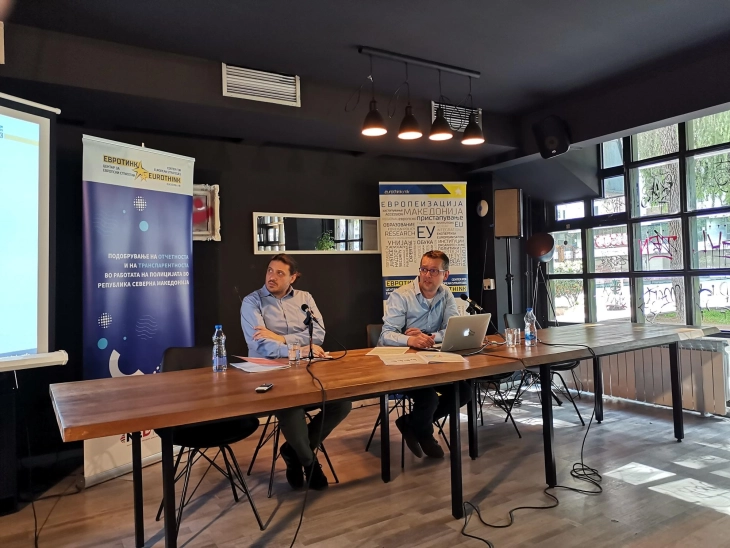Eurobarometer 2024: Citizens trust army, religious institutions and police most, prosecution and judiciary least
- The citizens trust the Army the most (44 percent), followed by the religious institutions (35 percent), the police (28 percent) and the president of the state (24 percent). The government has trust level of 18 percent, while the parliament has the lowest trust at 12 percent, followed by the prosecution and judiciary at 9 percent, according to the results of the 'Eurobarometer 2024' survey conducted by the Center for European Strategies - Eurothink.

Skopje, 12 April 2024 (MIA) - The citizens trust the Army the most (44 percent), followed by the religious institutions (35 percent), the police (28 percent) and the president of the state (24 percent). The government has trust level of 18 percent, while the parliament has the lowest trust at 12 percent, followed by the prosecution and judiciary at 9 percent, according to the results of the 'Eurobarometer 2024' survey conducted by the Center for European Strategies - Eurothink.
The survey of public opinion was conducted via telephone by the Brima agency on a representative sample of 1,001 respondents from January 31 to February 14, 2024, with a margin of error of 3.1% as part of the 'Perceptions and Attitudes of Citizens towards Police Work in February 2024' study.

“According to the survey, there's a slight increase rise in trust towards the police, the focal institution of this project. Traditionally, the Army and religious communities claim the top spots, with the police typically ranking fourth; however, this time it occupies third place. Next in line are the president of the state, non-governmental organizations, and security intelligence institutions. The government has trust level of 18 percent, while trust in the State Commission for Prevention of Corruption and the Prosecution are 15% and 13% respectively. Only nine percent of respondents trust the parliament, the judiciary, and the prosecution,” Aleksandar Stojanovski from Eurothink told a press briefing on Friday.
When it comes to the police, there's been a general improvement in the perception of the respondents, except in the area of the functioning of administrative services for issuing personal documents.
“In the police force, professionalism receives the highest rating at 31%, while independence from partisan, governmental, and business interests is rated lowest at 12%. Negative sentiments prevail in this year's survey, echoing trends observed in previous surveys," Stojanovski noted.
When asked whether citizens believe that the police will protect them if their safety is threatened, he said, the responses are almost identical to previous surveys, adding that a larger portion of them believe they will be protected. One-fifth of the respondents had some form of contact with the police, with the majority of citizens initiating contact themselves. Among those who had contact with the police, many needed to report incidents to internal affairs. Awareness of external oversight of police work is also increasing.

“Almost 34 percent of the respondents consider the accessibility of information related to document issuance as poor, while nearly 40 percent rate the performance of the police administrative services responsible for issuing documents as poor. Compared to 2022, the assessment of poor accessibility of information related to document issuance procedures is around 23 percent, while for the performance of administrative services in 2022, only 23 percent of the respondents rated it as poor. In relation to the performance of administrative services, only 20 percent of the respondents expressed satisfaction this year, whereas in 2022, the percentage was as high as 50 percent,” Stojanovski said.
He believes that the high trust in the Army is not due to the country's entry into NATO.
“Trust in the Army would not be linked to our entry into NATO. Probably citizens see this institution as a greater protector or an institution that is less prone to influences such as partisan bias, corruption, abuse, and instrumentalization of the institution for various purposes,” Stojanovski added.
The study was conducted as part of the project “Improving the accountability and transparency of the police in the Republic of North Macedonia,” which is being implemented from July 2022 to June 2024 and is supported by the United States National Endowment for Democracy.

“The main goal of the project is to contribute to the development of the police and police work in the Republic of North Macedonia by increasing the democratic capacity of the police organization through activities for improved transparency and accountability,” Dimitar Nikolovski from Eurothink said.
As he mentioned, activities have been undertaken within the framework of the project to develop a methodology for monitoring accountability and transparency, along with three measurements, and three trainings for representatives of the police, external mechanisms for police control, and journalists. Additionally, eight regional meetings have been held involving citizens, police, journalists, and civil society.
Photo: MIA







